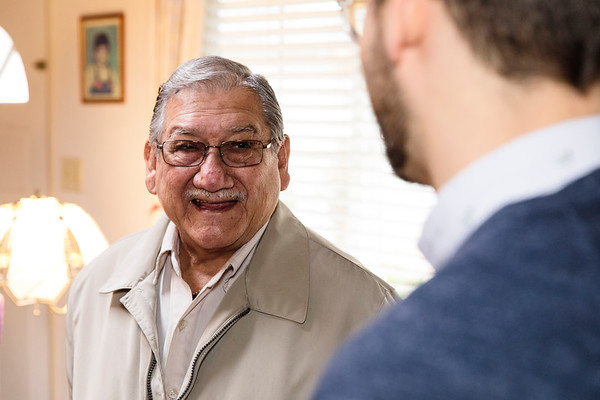With the recent outbreak of the novel coronavirus COVID-19, we know that seniors are especially vulnerable to illnesses. To protect your aging parents, there are several steps you can take that can prevent the spread of viruses and promote health.
Are you concerned about an aging loved one falling ill? Here are some measures you can take to keep them safe.
1. Wash your hands frequently
It’s critical to wash your hands whenever you come in contact with a senior or enter their home. Handwashing can help prevent the spread of viruses that cause illness. Wash your hands with soap for 20 seconds – or the time it takes to sing “Happy Birthday” twice.
You should also use alcohol-based hand gels to keep your hands clean. Store sanitizing gel in your car or purse so that it is easily available when visiting seniors. Be sure that your older loved ones have an adequate supply of hand soap and hand sanitizer in their homes.
2. Avoid large gatherings
Crowds of people can increase your chances of carrying harmful viruses. Even if you do not show symptoms of an illness, you may carry germs with you and transfer them to the seniors you come into contact with.
If you do enter a large gathering, be sure to wash your hands and change your clothing before visiting older adults. Encourage aging loved ones to do the same and avoid crowded areas when viral outbreaks occur.
3. Disinfect high traffic areas
Sometimes, it’s difficult for seniors to perform household tasks such as cleaning. Help your older loved ones sterilize their homes with a disinfectant.
Wipe down hard surfaces, faucets, doorknobs, remote controls, and other places that are frequently touched. It’s also a good idea to disinfect your home and car so that you do not carry viruses with you when you visit.
4. Check on their food supply
One way to promote health is to eat a sufficient amount of nutritious foods. Check your aging loved ones’ food supplies for healthy, nutrient-rich foods.
You may need to go to the grocery store to purchase food for seniors, especially in instances such as a pandemic. You may also want to consider setting your aging parents up with a home meal delivery service.
For example, Meals on Wheels of Northeast Ohio provides nutritious, home-delivered meals to seniors and people with disabilities in Stark, Summit, and Wayne Counties (Ohio). Meals cater to a variety of tastes and special diets for a reasonable cost. You may even be eligible for donation-funded meals.
5. Know their medical information
Know your aging parents’ medical information to be prepared for the event they become ill. Be aware of their medical history, allergies, doctors’ names and phone numbers, and pre-existing conditions.
Document their medical information and tell your spouse, grown child, or friend where to access it in case you are unavailable.
6. Keep them engaged
Socialization is key to aging in place. But in times such as a viral crisis, social distancing is necessary to avoid illnesses. When this occurs, find ways to keep your aging loved ones engaged without contact.
Encourage seniors to explore old hobbies and interests such as art, gardening, reading, or walking. All of these activities are safe and do not involve human contact, keeping them safe and engaged.
Phone calls and video chats are also a great way to be social without being in close quarters. In addition to your phone calls, consider introducing your older parent to a phone buddy program. Telecare, an initiative of the Retired and Senior Volunteer Program, matches volunteers with seniors for friendly conversations and check-ins.
Keeping aging loved ones safe
Our aging parents have done so much for us, and have protected us our entire lives. Now, it’s time to take some steps to prevent them from harm.
Although we can never be one hundred percent certain that the seniors in our lives are protected, we can do our part in preventing them from contracting illnesses. If you have any questions about additional measures to take, the Centers for Disease Control and Prevention, World Health Organization, and your local healthcare professionals are all great resources.
*The information in this article is intended solely to provide general information on matters of interest for the personal use of the reader, who accepts full responsibility for its use. This article should not be used as a substitute for consultation with professional legal, medical, or other competent advisors.

